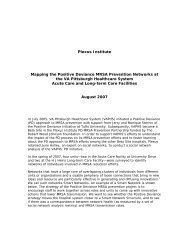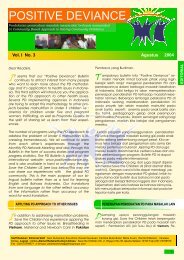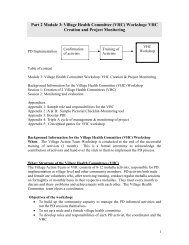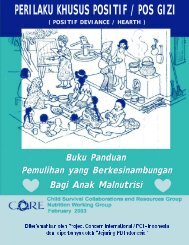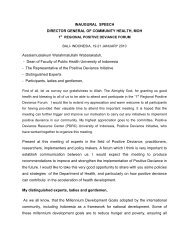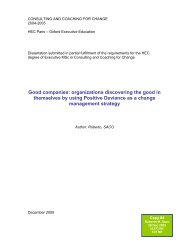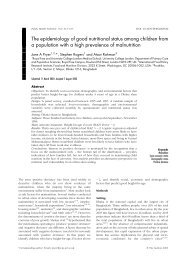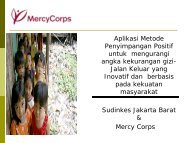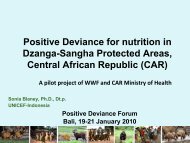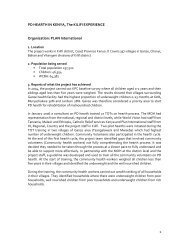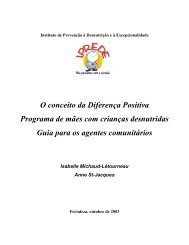F&N Bulletin Vol 23 No 1b - United Nations University
F&N Bulletin Vol 23 No 1b - United Nations University
F&N Bulletin Vol 23 No 1b - United Nations University
Create successful ePaper yourself
Turn your PDF publications into a flip-book with our unique Google optimized e-Paper software.
Discussion paper 116. A multiple-method approach to<br />
studying childcare in an urban environment: The case<br />
of Accra, Ghana<br />
Marie T. Ruel, Margaret Armar-Klemesu, and Mary Arimond<br />
There are increasing concerns about the impact of<br />
rapid urbanization and the growth of urban poverty<br />
on access to adequate food and nutrition by the urban<br />
poor. The high dependence on cash income, the exposure<br />
to high levels of air, food, and water contamination,<br />
and the increasing necessity of women to<br />
participate in income-generating activities are examples<br />
of some of the constraints faced by the urban poor.<br />
The Accra Urban Food and Nutrition Study<br />
(AUFNS) was conducted to investigate the nature<br />
of urban poverty and the interrelationships among<br />
urban poverty, food insecurity, and malnutrition in<br />
a major urban African center (Accra, Ghana). The<br />
ultimate goal was to provide high-quality information<br />
to policymakers and to promote appropriate policies<br />
for programs for intervention in urban poverty, food<br />
security, and malnutrition. The AUFNS consisted of<br />
three types of data collection: a participatory rapid<br />
appraisal (PRA), a representative quantitative survey<br />
of Accra, and a small observational study.<br />
Purpose of this paper<br />
This paper focuses on one of the subthemes addressed<br />
by the AUFNS: the role of care as an input into child<br />
nutrition and the relative contribution of a number<br />
of maternal and household resources to the provision<br />
of care. The main goal was to integrate the findings<br />
from the three primary data sources and to specifically<br />
address the following questions: Is care an important<br />
input into child nutrition in Accra? Which care<br />
practices are most crucial for child nutrition? Which<br />
maternal and household resources contribute the most<br />
to enhancing care in Accra? What are the program and<br />
policy responses to promote optimal childcare practices<br />
in this urban context? How do the three research<br />
approaches used to measure childcare complement<br />
each other?<br />
Methods<br />
The research was carried out in three stages and was<br />
preceded by an initial roundtable seminar convened in<br />
Accra to elicit the views of key stakeholders. The first<br />
stage involved a series of qualitative data-collection<br />
activities to identify key issues to be followed up in<br />
the quantitative phase, to guide the design of a survey<br />
questionnaire, and to build up an understanding of<br />
the Accra urban context from the point of view of the<br />
poor. The second phase was a representative quantitative<br />
survey of 556 households, and the final stage<br />
was an observational study of a small subsample of<br />
households. The main purpose of this last component<br />
was to gain a more in-depth understanding of aspects<br />
of childcare that could not be explored through recall<br />
techniques, such as intrahousehold processes involving<br />
food and nutrient distribution, maternal time and<br />
child feeding, and care practices.<br />
Is care an important input into child<br />
nutrition in Accra?<br />
The Accra study provides unequivocal evidence of<br />
the crucial role of childcare practices as a key input<br />
into children’s nutritional status. Children whose<br />
mothers had poor childcare practices were up to three<br />
times more likely to be stunted than those whose<br />
mothers had good care practices. Care was more critical<br />
for children whose mothers had less than secondary<br />
schooling and for children from households of lower<br />
socioeconomic status. Good care practices appeared to<br />
mitigate the negative effects of low maternal education<br />
and poverty.<br />
106 Food and Nutrition <strong>Bulletin</strong>, vol. <strong>23</strong>, no. 1 © 2002, The <strong>United</strong> <strong>Nations</strong> <strong>University</strong>.




